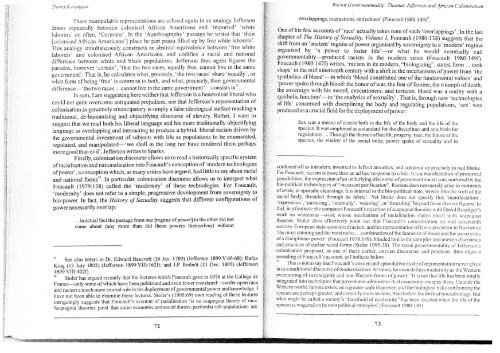Shane Moran - Alternation Journal
Shane Moran - Alternation Journal
Shane Moran - Alternation Journal
You also want an ePaper? Increase the reach of your titles
YUMPU automatically turns print PDFs into web optimized ePapers that Google loves.
JI~ivi (1 kiiztitz~za~z<br />
Raclal Governr~zentallt)) Thornas ./efferson and Afr~can Colonrsat~on<br />
overlappings. interactions, and echoes' (Foucault 1980: 149)".<br />
These mai~ipulable I-epresentations are echoed again in an analogy Jefferson<br />
draws repeatedly between colonised Afikan A~nericans and '~mported' 'wh~tc<br />
his few accounts of 'race' actually takes note of such 'overlappings'. In the last<br />
laborers' or, often, 'Ge~~nans' In the 'Autobiogl-aphy' passage he wrltes that 'their<br />
of The History of Sexuality, Volume I, Foucault (1980: 138) suggests that the<br />
[colonised Afi-ican Americans'] place be par1 passu filled up by free white laborers'.<br />
.om an 'ancient' regime of power organised by sovereignty to a 'modem' regime<br />
This analogy simultaneously constructs an abstract equ~valence between 'free white<br />
ised by 'a power to foster life'-or what he would eventually call<br />
laborers' and colonised African Americans, and codifies a racial and national<br />
entality-produced racism in the modern sense (Foucault 1980: 149f).<br />
difference between white and black populations Jefferson thus again figures the<br />
(1980: 1470 writes, 'racism in its modern, "biologizing", statist fonn ... took<br />
paradox, however 'certain', 'that the two races, equally free, cannot live in the same<br />
m the mid nineteenth century with a shift in the mechanisms of power from 'the<br />
government'. That is, he calculates what, precisely, 'the two races' share 'equally', or<br />
olics of blood'-in which 'blood constituted one of the fundamental values' and<br />
what form of being 'free' is corninon to both, and what, precisely, their governmental<br />
r spoke through blood: the honor ofwar, the fear of famine, the triumph of death,<br />
difference-'the two races ... cannot live ~n the same government'-consists ini7.<br />
vereign with his sword, executioners, and tortures; blood was a reality with a<br />
In sum, I ain suggesting here neither that Jefferson is a benevolent liberal who<br />
olic function'-to 'the analytics of sexuality'. That is, through new 'technologies<br />
could not quite overcome antiquated prejudices, nor that Jefferson's representation of<br />
ife' concerned with disciplining the body and regulating populations, 'sex' was<br />
colonisation as genuinely emancipatory is simply a false ideological surface masking a<br />
uced as a crucial field for the deployment ofpower:<br />
traditional, de-humanising and objectifying discourse of slavery. Rather, I want to<br />
suggest that we read both his liberal language and his Inore traditionally objectifying<br />
Sex was a means of access both to the life of the body and the life of the<br />
species. It was e~nployed as a standard for the disciplines and as a basis for<br />
language as overlapping and interacting to produce a hybrid, liberal racism driven by<br />
regulations .... Through the themes of liealth, progeny. race, the future of thc<br />
the governmental investment of subjects with life as populations to be enumerated,<br />
species, the vitality of the social body, power spoke of sexuality and to<br />
regulated, and manipulated-'we shall in the long run have rendered them perhaps<br />
more good than evil', Jefferson writes to Sparks.<br />
Finally, colonisation discourse allows us to read a historically specific system<br />
of racialisation and nationalisation into Foucault's conception of 'modem technologies ed off as intruders, inventcd to deflect anxieties, and conjured up prccisely to nail blame.<br />
of power', a conception which, as many critics have argued, had little to say about racial ~lcault. racism is more than an ad hoc response to crisis: it is a manifestation of preserved<br />
and national form^'^. In particular, colonisation discourse allows us to interpret what<br />
'lities, the expression of an underlying discoursr of permanent social war, nurtured by tile<br />
Foucault (1979: 138) called the 'modernity' of these technologies. For Foucault, political technologies of "incessent purificatiotl". Racism does not rnerely arise in molnents<br />
'modernity' does not refer to a simple, progressive development from sovereignty to<br />
bio-power. In fact, the History of Sexuality suggests that different configurations o<br />
power necessarily overlap:<br />
... in actual fact the passage from one [regime of power] to the other did not<br />
come about (any more than did these powers themselves) without<br />
" See also letters to Dr. Edward Bancroft (26 Jan. 1789) (Jefferson 1899.V:66-68); RU<br />
King (13 July 1802) (Jefferson l899.V111:162f); and J.P. Reibelt (21 Dec. 1805) (Jefferso<br />
1899.VIII:402f).<br />
'' Stoler has argued recently that the lectures which Foucault gave in 1976 at the Colltge de<br />
France-only some of which have been published and even fewer translated-confer upon race<br />
and racism a much more central role in the deployment of governmental power and knowledge. I<br />
llave not been able to exa~nine these lectures. Stoler's (l995:69) own reading of these lectures<br />
intriguingly suggests that Foucault's account of racialisation 'is no scapegoat tlleory of ra<br />
Scapegoat tlleories posit that under economic and social duress, particular sub-populations a
















